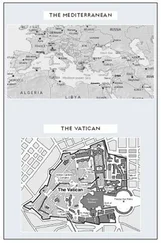To avoid the eyes of the handful of people milling about the open plaza, Rhun followed Bernard into the shadowy refuge of Bernini’s colonnade that bordered the piazza’s edges. The massive Tuscan columns, four deep, should keep their preternaturally swift passage hidden. Bernard joined a contingent of other Sanguinists who waited in the shadows for the cardinal. As a group, they rushed along the sweep of the colonnade toward the entrance to the Holy City.
Once they reached the waist-high fence that divided the Vatican city-state from Rome proper, Rhun’s eyes scanned the nearest rooftops. He remembered the shared vision he had with Elisabeta, of her leaping from rooftop to rooftop.
The furious honk of a car horn drew his eyes below, to the cobblestone street that led here.
Fifty yards away, the small shape of a woman fled down the center of Via della Conciliazione, limping on one leg. Though her hair was shorter, he had no trouble recognizing Elisabeta. A white car swerved to miss her.
She paid it no mind, intent on reaching St. Peter’s Square.
Trailing behind her, a dozen strigoi loped and sprinted.
He longed to burst from the colonnade and run to her, but Bernard put a steadying hand on his arm.
“Stay,” the cardinal warned, as if reading his thoughts. “Humans are on that street and in those houses. They will see the battle, and they will know. We have millennia of secrecy to protect. Let the fight come to us.”
As Rhun watched, he recognized the pain in Elisabeta’s thinned lips, her fearful glances behind. He remembered the same panic when looking through her eyes.
She is not leading this pack — she’s fleeing them.
Despite all she had done to him, to the innocents of the city, a reflexive surge to protect her fired inside him. Bernard’s fingers tightened on his shoulder, perhaps feeling him lean forward, ready to dash to her defense.
Elisabeta finally reached the end of the street. The other strigoi were almost upon her. Not slowing, she hurdled the low fence that marked the boundary of Vatican City and landed in a half crouch, facing the snarling pack.
She sneered, exposing her fangs, and taunted them. “Cross to me if you dare.”
The pack pulled hard to a stop beyond the fencerow. A few took a cautious step closer, then away again, sensing the debilitating holiness of the hallowed ground on this side. They wanted her, but would they dare enter Vatican City to get her?
Holy ground was not all they had to fear here.
The Sanguinist force waited to either side of Rhun and Bernard, as still as statues among the columns. If the strigoi came into the city, the beasts would be pulled into this shadowy forest of stone and slaughtered.
Elisabeta retreated from the fencerow — but she put too much weight on her hurt leg, and her ankle finally gave out fully, dropping her to the pavement.
The sign of weakness was too much for the strigoi to resist. Like lions descending upon a wounded gazelle, the pack surged forward.
Rhun ripped out of Bernard’s grip and burst into the open. He flew toward Elisabeta, as much a creature of instinct as the strigoi . He reached her at the same time that the pack leader, a huge figure with ropy muscles and blue-black tattoos, bounded the fence and landed on the countess’s far side, baring his teeth.
More strigoi followed his example, flowing over the fence.
Rhun grabbed her by the arm and retreated toward the colonnade, dragging her, hoping to lure the pack into the stone forest.
The leader barked an order and an overzealous beast rushed forward.
Heaving with one arm, Rhun threw Elisabeta like a rag doll into the colonnade and slashed out with his karambit . The silver blade cut through the air — then through flesh. The feral youngster fell back, clutching his throat as blood and breath bubbled out of his severed neck.
Other strigoi surged forward as Rhun retreated — only to be met at the edge of the colonnade by Bernard and the other Sanguinists.
A brief battle raged among the columns. But with the pack caught by surprise and weakened by holy ground, it was a slaughter. A few broke away, leaping the fence and scattering like vermin into the streets, fleeing both the fight and the sun.
Rhun found himself confronting the hulking leader. Upon his bared chest, a Hieronymus Bosch painting had been tattooed, a hellish landscape of death and punishment. It came to life as his muscles rippled, lifting his heavy blade.
Rhun’s blade looked contemptibly small compared to that length of steel.
As if knowing this, spite polished the other’s dark eyes to a wicked gleam. He sprang at Rhun, hacking that sword downward at his head, ready to cleave him in two.
But holiness slowed the strigoi ’s attack, allowing time for Rhun to duck inside the other’s guard. He turned the hook of his karambit up and sliced into the other’s belly. Ripping high, he tore that grotesque canvas in half and kicked the body away.
The gutted bulk toppled to the edge of the columns, one arm flinging out into the light — into sunlight . The limb burst into flame. Another Sanguinist helped Rhun yank the body back into the shadows and stanched the flames before the fire drew unwanted attention.
A few faces turned toward the shadows, but most remained oblivious of the swift and deadly battle within the colonnade. As Rhun stared at the sunlight brightening the plaza, fear rang through him.
Elisabeta…
He turned to find Bernard looming over her huddled form, her face to the ground. She surely felt the blaze of the new day, sensed its burn. For now, her only safety lay within the shadowy shelter of the colonnade. To step beyond it would be her death.
Bernard grabbed her by the shoulder, looking ready to cast her out into the square, to face the judgment of a new day. Sanguinists crowded around him, reeking of wine and incense. None would stop the cardinal if he chose to slay her. She had led strigoi to the holiest city in Europe.
Bernard buried a hand in her short hair, yanked her head back, rested his blade against her soft white throat.
“No!” Rhun called out, rushing forward, shoving through the others.
But it was not his shout that halted the cardinal’s blade.
7:52 A.M.
Shock froze Bernard in place — along with utter disbelief.
He stared at the woman’s face as if she were a ghost.
It could not be her.
It must be a trick of light and shadow, his mind indulging in fantasy, a strigoi with an uncanny likeness. Still, he recognized the silver eyes, the raven color of her hair, even the indignant, haughty expression as his blade rested against her soft throat, as if she dared him to take her life.
Countess Elizabeth Bathory de Ecsed.
But she had perished centuries ago. Bernard had seen her imprisoned in her castle. He had even visited her there once, pitied her, the learned noblewoman brought low by Rhun’s base desires.
But Bernard bore as much guilt for that crime. Centuries ago, he had put the woman on this cruel path when he set the countess and Rhun together, when he tried to force his will upon divine prophecy. Afterward, Bernard had begged to be the one to take her life, to spare Rhun of such a deed, knowing how much he had loved her, how far he had fallen for her. But the pope had deemed it part of Rhun’s penance to end her unnatural life, to slay the monster that he had created.
Bernard had worried when Rhun returned from Hungary. Rhun had claimed the deed was done, that the countess was gone from this world. Bernard had taken it to mean she was dead, not put away like a doll in a drawer. At the time, as additional penance, Rhun had starved himself for years, mortified himself for decades, shutting himself off from the mortal world.
Читать дальше










